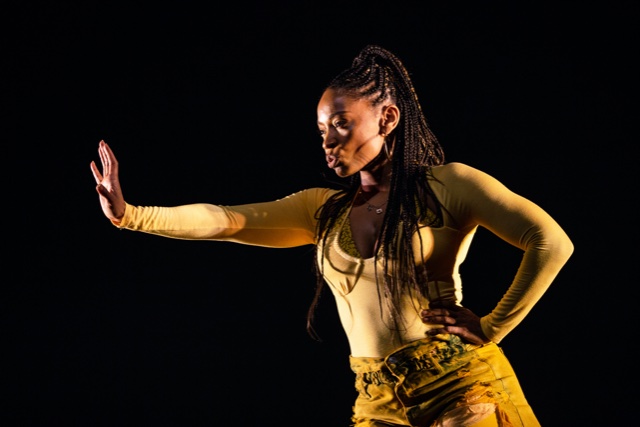Ntozake Shange's For Colored Girls on Broadway
Poet's Language Dances
By: Susan Hall - Jun 02, 2022
Ntozake Shange began developing poems on the West Coast as a spoken word artist. She speaks to girls who are maturing into women. Black girls, yes. Yet white girls understand her too.
What did words mean to Shange? Her sister Ifa Bayeza describes it best.
One day she came home from school thrilled because they were just teaching students to write their names. Bayeza, who had been taught by a cousin, already knew how to print her name in big tall sticks that formed capital letters.
Shange, who was 7 or 8 at the time, looked at her, “That’s not writing, this is writing.”
Shange took up a piece of paper and wrote beautiful letters that made Bayeza delirious. Bayeza says, “The words looked like they were dancing off the page.” They had flourish and drama and beauty. That’s what Shange went on to do with her life.
Moving back to the East coast, her birth home, Shange started performing three poems together in the Rivbea studio space. Soon afterwards, she met Oz Scott, a young NYU trained director, and a friend of Ifa’s.
At the DeMonte bar on the lower east side, Shange worked with Scott to dramatize what would become a twenty poem sequence. When Scott needed to add an element, he would turn to Ifa,who knew her sister’s poetry better than anyone. Ifa always delivered spot-on material.
One day,Woodie King Jr, who had created the New Federal Theater at the Henry Street Settlement, came to see the drama Scott had created. The day before Ifa had delivered the poem “Sorry.”
Ten ladies were now performing. They would be cut forever to seven when the production moved out of the bar. "Sorry" would be spoken by many of the Ladies of Colors. Only one actor worked on it now. When Scott told her it had to be ready for Woodie King the next day, she said, "No way."
Woodie King would hear her recite the poem perfectly:
'if you called
to say yr sorry
call somebody
Else
i dont use em anymore'
one thing i dont need
is any more apologies
i got sorry greetin me at my front door you can keep yrs
i dont know what to do wit em
they dont open doors
or bring the sun back
they dont make me happy
i let sorry/ didnt meanta/
& how cd i know abt that take a walk down a dark & musty street in brooklyn i'm
gonna do exactly what i want to
& i wont be sorry for none of it
i'm gonna tack a sign to my door leave a message by the phone
'if you called
to say yr sorry
call somebody
Else
i dont use em anymore'
King felt like every man who had ever said "sorry" for some sleazy deed. He was also ready to transfer this fledgling drama, beautifully shaped by Oz Scott, right over to his theater.
Word of mouth brought crowds. Joe Papp wanted to move it up to the Public Theater where it attracted more crowds. It successfully transferred to the Booth theater on Broadway where it is being revived now.
The sequence of the poems created by Scott was locked in stone at that time. The girls mature to feel not only that men are saying "sorry" when they do hurtful 'stuff', but that ‘somebody is taking all their stuff.’ Stuff here is character, needs and wants. Finally there’s Beau, who only wants to get married and accidentally drops his two children out the window.
The play’s forthright, personal discussion of trauma and abuse experienced by Black women was taken by some as an affront to Black men. “There was quite a ruckus about the seven ladies in their simple colored dresses,” Shange wrote decades later. “I was truly dumbfounded that I was right then and there deemed the biggest threat to black men since cotton pickin’, and not all women were in my corner, either.”
What has changed is the definition of choreopoem, a term Shange invented to describe the work. Originally the term means what Ifa would call “words dancing off the page.” Shange’s words danced, their meanings enhanced by rhythm.
Shange would later call herself a choreographer who wrote for a living, but this misrepresents her central talent as a wordsmith, in this play probing the depths of girls maturing to discover their pain and their truths.
Woodie King immediately identified the language as uniquely American Black, growing out of the cotton fields of the South and recorded early on by Alan Lomax and Cadillac Records. Smokey Robinson has it. Amira Baraka, and so on.
The play preceded “Vagina Monologue” which is a white version, created In 1996 twenty years later. It speaks to girls of all colors of the rainbow in their urgent need to understand.
Lynn Nottage, the two-time Pulitzer Prize winning Black playwright, said the play “definitely spoke to a generation of young women who didn’t feel invited into a theater space, who suddenly saw representation of themselves in a very honest way, and understood that they could occupy that space for the first time.” It’s unlikely that white young women felt invited either.
Shange’s sister Ifa Bayeza puts it best: “ I don’t think there’s a day on the planet when there’s not a young woman who discovers herself through the words of my sister.” That’s all young women, mind you. Nothing is dated about this play. Why the abortion poem, with the deed about to be illegal again, seems more of tomorrow than today.
Shange’s words live on at the Booth this spring, in the colorful and energetic production of Camille A. Brown. Nominated for six Tonys!



